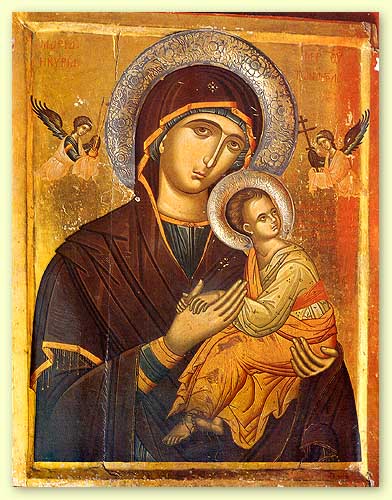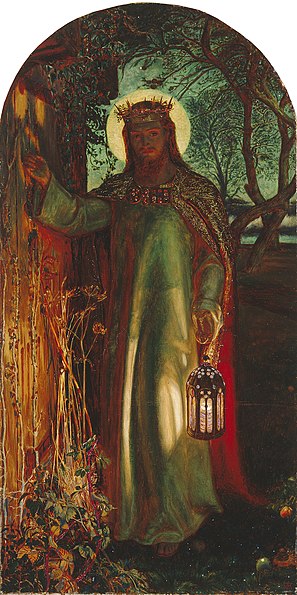Christ the King, a detail from the Ghent Altarpiece by Jan van Eyck.
The Latin antiphon is:
- O Rex Gentium, et desideratus earum,
- lapisque angularis, qui facis utraque unum:
- veni, et salva hominem,
- quem de limo formasti.
which is in English:
- O King of the nations, and their desire,
- the cornerstone making both one:
- Come and save the human race,
- which you fashioned from clay.
"For a child has been born for us, a son given us; authority rests
upon his shoulders; and he is named Wonderful Counsellor, Mighty God,
Everlasting Father, Prince of Peace." Isaiah 9:6
"He shall judge between the nations, and shall arbitrate for many
peoples; they shall beat their swords into ploughshares, and their
spears into pruning-hooks; nation shall not lift up sword against
nation, neither shall they learn war anymore." Isaiah 2:4
If you are going to acknowledge Christ as King of the Nations, then using a prayer from one of them may not be a bad thing.
"May all beings everywhere plagued with sufferings of body and mind
quickly be freed from their illnesses. May those frightened cease to be
afraid, and may those bound be free. May the powerless find power, and
may people think of befriending one another. May those who find
themselves in trackless, fearful wildernesses - the children, the aged,
the unprotected - be guarded by beneficent celestials, and may they
swiftly attain Buddhahood." Buddhist prayer
I can reconcile this one with my faith as the "beneficent celestials" to me are "angels and archangels and the whole company of heaven" . As to "attaining Buddahood" - well, being perfected in Christ through his Incarnation, Death and Resurrection is achieving perfect fulfilment or Buddahood. If Christ is the Cornerstone, then he draws all nations and faith to himself and perfects in due course all our errors and misunderstandings. or Anonymous Christianity - the theological idea that declares that those who have never heard the Gospel might be saved.
You can find traces of this idea in the Vatican 2 document "Lumen Gentium",
which states that those "who no fault of their own, do not know the
Gospel of Christ or His Church, but who nevertheless seek God with a
sincere heart, and moved by grace, try in their actions to do His will
as they know it through the dictates of their conscience – those too may
achieve eternal salvation". (LG para 15)
The German Jesuit theologian Karl Rahner's put it more forcefully:
Non-Christians could have "in [their] basic orientation and fundamental
decision, accepted the salvific grace of God, through
Christ, although [they] may never have heard of the Christian
revelation."
King of the nations, bring ALL your children into the fullness of life that is your will for us all. Amen.












